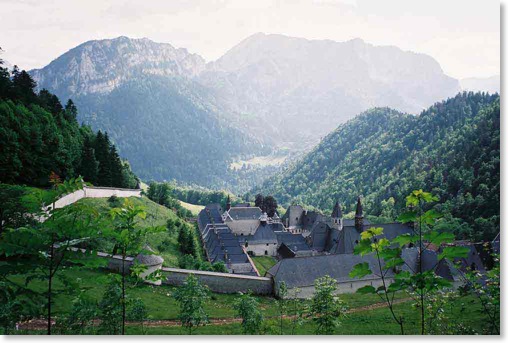My photos
The Carthusians
Alone together
On one of my bookshelves there are books by and about Carthusians, then Camaldolese, Cistercians, Benedictines, and Jesuits. It is a sort of spectrum. Teenagers would probably describe Carthusians as the most "hard out" monks - "hard core".

In some ways they reflect what many of us Christians now experience. Many of us no longer live in a Christian society. We are Christians working, sometimes living, in isolation from each other. Karl Rahner's description of the Christian diaspora is, in many places, being fulfilled.
The Carthusians spend much, most of their life alone. But they are conscious of the Carthusian community they are part of. They meet for prayer three times a day, for a shared meal (in silence) once a week, for "recreation", and for a walk together once a week.
Like them, we may be Christians alone, but hopefully conscious of being part of the larger Christian community. The body of Christ. Alone together.
The Fathers do nothing - the brothers help them do it
The Carthusian community is made up of “Fathers”, who spend their time primarily in the seclusion of their “cell”, and “Brothers” who have more of a community life and work around the monastery (in their “obedience”).
There is a saying: the Fathers do nothing; and the brothers help them to do it. The Fathers have room service – the brothers bring their food which is placed in a hatch. (Just like there may be black White Father brothers, and big Little Brother fathers) the brothers may be priests (transferred “diocesans”, or from another order). Traditionally those in the two-up, two-down town-house-type isolated “cell” have either been priests, or training for the priesthood. More recently it is now possible to stay in cell and not be ordained a priest.
As well as the Fathers and Brothers, there are Donates, who do not take the traditional monastic vows of stability, conversio morum, and obedience, but rather make promises to the monastery of poverty, chastity, and obedience. These promises may be regularly renewed indefinitely. Or one might make a life donation to the monastery. Then there are “Familiars”, sharing in the life of the monastery but without any vows or promises.
The picture I am describing is symbiotic, complementary relationships. All necessary for the healthy running of the life. Might not a parish, a church, a family, a school, any community benefit from realising and articulating that, different though we all be, with different gifts that we all might contribute, we need each other, we complement each other, we are many parts of the one body of Christ.
What is the point?
A common response to finding out about Carthusians is: "What is the point of that? What good do they do?" Carthusians have no active apostolate or ministry. You cannot go on retreat to a Carthusian hermitage. In 1984 Philip Gröning asked the Carthusian monks of the Grand Chartreuse if he could make a documentary about them. They said they were not ready for this, but they would get back to him. Sixteen years later they contacted Gröning. They were ready. Gröning was invited, without crew and artificial lighting, to record their daily lives, prayer, and rare outdoor walks.
Some try and justify this lifestyle by saying these monks pray for us, for the world. I'm sure they do. But I do not believe that is justification enough. We live in a world where often means and ends are confused. Or ends, "purpose", "goal", not even thought about. St Ignatius Loyola (much influenced by the Carthusians) has a clear primary goal: we are created to praise, reverence, and serve God our Lord. All the rest is the means to that end. We are made for God. The cloister, prayer, monasticism - these are just as much means as work, marriage, family, and television. The Carthusians highlight in a stark way, possibly the starkest way, that each of us is meant for God.
In the enthusiasm for the five-fold mission statement of the (Anglican) church (proclaim the gospel, nurture believers, care for people, transform unjust structures, care for creation) I have long been concerned that our primary mission as church - worship God - is being overlooked. Carthusians remind me of this.
To be continued...
See also Daily Prayer/ the Daily Office/ the Prayer of the Church [the Rule of Benedict psalm scheme found on that page is used by the Carthusians]
Lectio Divina (the monastic discipline of reading the scriptures prayerfully)
Silent prayer
Review of movie: Into Great Silence
Download PDF document of current Carthusian Latin Mass and English translation thanks to Marianna Sousa
Notes by the translator (PDF) thanks to Marianna Sousa, the translator

